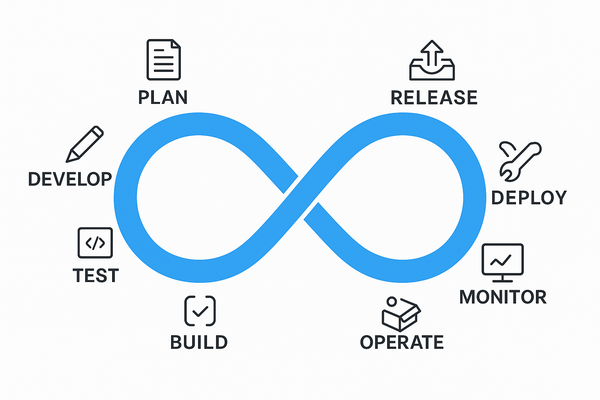In today’s fast-moving world of software, companies need to deliver updates quickly, reliably, and safely. it’s a powerful approach that combines development (Dev) and operations (Ops) to help teams work better together.
In this blog, we’ll break down what DevOps is, why it matters, and how it’s changing the way software is built and delivered.

What is DevOps?
At its core, it is a culture, mindset, and set of practices that bring developers and operations teams together.
Instead of working in silos — developers writing code, operations managing servers:
Collaboration
Communication
Automation
With this, teams can build, test, and release software faster and more reliably.
Why is DevOps Important?
Here’s why companies adopt DevOps:
- Faster releases: Deliver new features and updates quickly.
- Improved collaboration: Break down walls between teams.
- Higher quality: Automated testing reduces human error.
- More stability: Better monitoring and rollback tools help maintain uptime.
- Happier teams: Developers and operations work as partners, not rivals.
DevOps Tools (A Quick Look)
There’s no single “DevOps tool,” but here are some popular categories:
- Version Control: Git, GitHub, GitLab
- CI/CD: Jenkins, GitHub Actions, GitLab CI
- Containers: Docker, Kubernetes
- Configuration Management: Ansible, Chef, Puppet
- Cloud: AWS, Azure, Google Cloud
- Monitoring: Prometheus, Grafana, ELK stack
How Devops Works (Simple Example)
Imagine you’re building a web app.
1️⃣ You write code and push it to GitHub.
2️⃣ A CI/CD pipeline automatically runs tests.
3️⃣ If tests pass, the app is deployed to a server or cloud.
4️⃣ Monitoring tools check if everything is working smoothly.
5️⃣ If something breaks, you get alerts and can quickly fix it.
All of this happens automatically
💡 Key Principles
- Automation: Automate everything from testing to deployment.
- Continuous Integration (CI): Merge code frequently and test automatically.
- Continuous Delivery (CD): Deploy updates to users quickly and safely.
- Collaboration: Developers, testers, operations, and even security work together.
- Monitoring: Watch systems in real time to catch problems early.
Key Takeaways
- DevOps is not just tools — it’s a culture and set of practices.
- It helps teams work together, automate, and deliver faster.
- Learning this gives you valuable skills for today’s tech jobs.
Next Steps
- Follow our tutorials
- Explore more career guides
- Subscribe to InsightClouds for weekly updates
- Subscribe our DevOps youtube channel
Leave a Reply